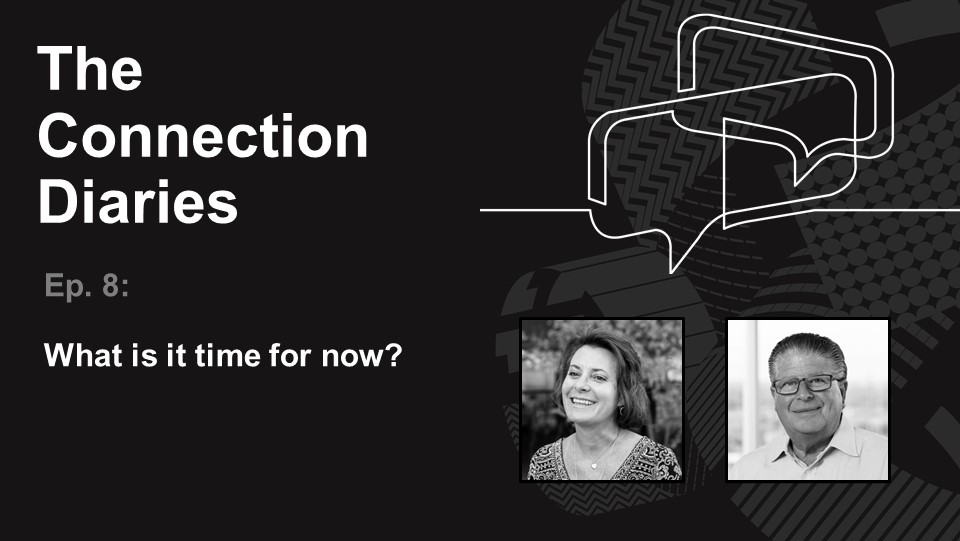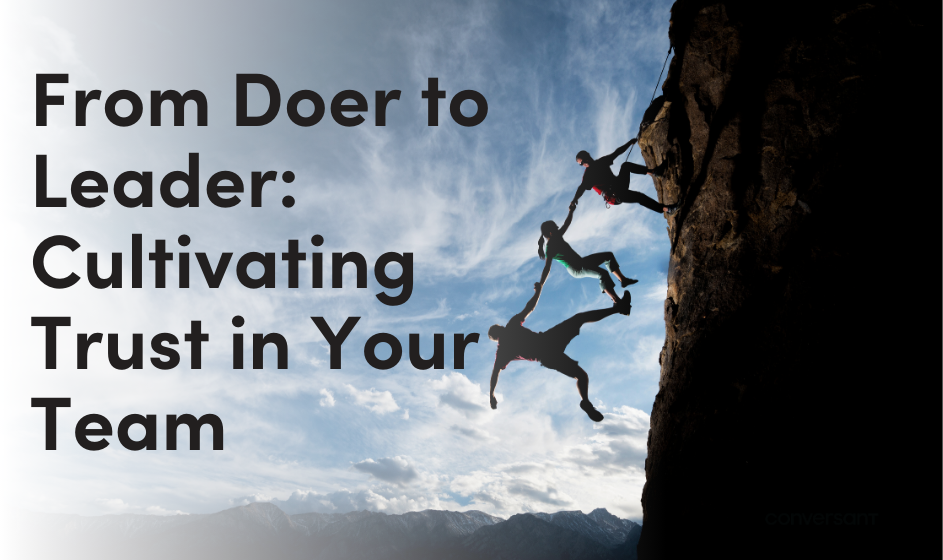What is it time for now?
In a given moment we can always do something, but we cannot do everything. The better our actions fit the moment, the more results we produce per unit of time, money, and stress. A great sense of timing is a leader’s contribution to an agile, ever-evolving enterprise, and in times of uncertainty and challenge, it becomes even more important.
In this video, Conversant colleagues Bill Boyar and Robin Anselmi give their thoughts on how attention to timing can guide leaders and organizations through periods of stress and unpredictability, particularly in three domains where leaders are charged with responsibility:
Creating Stability
Commit to transparency and make accurate information available to those you lead
When leaders are open and transparent about what they know and what they fear, the people in their organization can be more comfortable and more trusting. Hearing that some of their own fears are shared and knowing that leadership is reliable for communicating any relevant information as it comes to light sustains trust and builds a community of resilience and support.
Create a platform for communication and understanding and stick to the guiding principles of your organization
People are looking for guidance and leadership about the current moment more so than the future. When they have a platform for communicating their questions and concerns and for understanding the values and principles guiding decision-making, trust and collaboration go up, even if we don’t have all the answers right then and there.
Preserving Culture
The test of any organization’s culture and values is a crisis. When challenges arise, there is an opportunity for leadership to reinforce the purpose and values that were chosen for the organization when times were good. This is the time to walk the talk of your culture as leaders. If you can live consistently with these promises through a storm, your organization will be stronger than ever on the other side.
Confronting Strategy
It’s likely that plans previously set in place about the strategic direction of your organization don’t quite apply today given the circumstances. Many leaders are wondering if they should be thinking about how long-term strategy will be impacted by the current crisis and when they should start acting to shift and drive forward a new plan of action.
Our advice: this is not a time to think about a long-term strategic reset. Right now it’s time to focus on the needs of today, tomorrow, and next week. It’s time to think about the present day health of your business and your people and to look for things you can do in this moment to ensure they are cared for.
If you go into a conversation about a major long-term resent of your strategy right now, it will be like nailing Jello to a tree – it’s going to fall down no matter what. Instead, spend time reflecting on what you are learning as leaders and as organizations from this experience that can inform the future, trusting that you and your community will chart the path forward as you learn more.
To find more of our insights and tools on Timing, you can explore the Timing section of The Vitality Imperative and it’s online resources.
We will be hosting a live 30-minute conversation on this topic next week. You can register for that conversation as well as all of our upcoming webinars on our Community Gatherings page. We will continue to explore this topic and many others related to how we stay connected and keep creating value in challenging circumstances, so stay tuned for future episodes of The Connection Diaries.
If you and your community have been having inspiring conversations and ideas about how to navigate the COVID-19 reality, we would love to hear about them! Please comment below or connect with us on LinkedIn. Let’s unleash our collective brilliance.
Full Transcript
Robin: Hi everyone, I’m Robin Anselmi with Conversant. This is this week’s chapter of The Connection Diaries, a series of short conversations on leadership that we launched amidst the COVID-19 crisis. Today, I’m joined by my friend and colleague, vice chairman of Conversant, Bill Boyar. Bill is also the founder of a mid-market Huston based law firm, Boyar Miller. Welcome, Bill.
Bill: Thanks Robin, great to be with you.
Robin: So, today we’re going to talk about timing, and to get us started I want to make a distinction between time and timing. Time, we measure on a clock or calendar, right, it’s chronological. Timing for us is, “what is it time for now?” And so, Bill, how would you answer that question right now, today? What do you think it’s time for now for leaders?
Bill: So Robin, you know, when I think about answering the question what is it time for now, I think in sort of three domains—the three areas that as leaders today we’re charged with focus. One is stability, another is preserving our culture, and the other is confronting strategy.
Robin: On stability, I’m sure what most people that are listening to this would go, “Stability? How in the world do we do that today?” So, what would you say to that?
Bill: I think it’s—there’s two pieces to it. One is that we commit to provide accurate information to our people, so we’re transparent and open and accurate about what we know and what we fear. And the second piece of that is that we provide contexts and platforms for people to communicate, be in community together, and understand what our guiding principles are as organizations. And if people have some sense that the leadership is being open and transparent and has some of the same fears that they have, also they’ll be more comfortable, they’ll be more trusting. And I think that one thing that’s really occurred to me is the challenge to maintain sort of physical and mental well-being through all of this. And so, for one of our guiding principles is preserving jobs, as an example. That—that gives people something to hang on to. They know we’re in it for them, that we’re going to do what’s necessary as leaders to make the decisions and exercise judgments that are supportive of that principle.
Robin: Well I think in that, the two questions that I hear that I think all of us can be confronted by is, what do we know in the midst of all this? What can we do, and how do we bring the ‘we’ into that? What can we do as community? So, what would you say about culture in the midst of this?
Bill: To me, the test of culture in any organization is today. I mean, can you stand in purpose, can you live consistent with the core values or the guiding principles that you have chosen for your organization when things were good? If you can stand in purpose and live consistent with your values, you will have the—your team will come back together when this is all over, and your your organization will be stronger than ever. So to me, reinforcing purpose, demonstrating those values, is incredibly important. As important as ever. Those organizations where they’re—the cultural statements that they make are marketing tools will suffer greatly when we come back together and go back to work in the near future.
Robin: Yeah, so in that, you know, what I hear is like, what it’s time for now—this is the time to walk the talk of your culture, as leaders.
Bill: Absolutely.
Robin: And about strategy?
Bill: So, that’s the toughest one. All of us in our businesses adopted a plan either in previous years, or certainly a plan for this year going into January and February, and it’s clear that whatever those plans were they don’t apply today. So the question is, do you dive into that today, or do you think about reset later? And you know, the advice that I’ve been giving is this is no time to be thinking about long-term strategic reset. What it’s time for now is to think about today and tomorrow and next week, the health of your business today and what can you do today to drive revenue and take care of your people. And then, when we come out of this and get back to work, we’ll know more. I think the analogy for me about, you know, if you go into a conversation about, you know, a major long-term reset of strategy, it’s just like trying to nail jello to a tree. It’s gonna fall down no matter what you do, so you know, we keep telling our clients just, you know, in a time when it’s almost impossible to relax, relax about that.
Robin: Well I think the other thing it’s time for now in most organizations is some reflection on, what have we learned as leaders and as organizations from this experience that we—that actually inform our future? Whether, god forbid, there’s a second wave, or just about the future of our work. So this is a moment when we think about conversational timing for us to take stock of what have we been learning and how does that apply.
So, we’re gonna have a 30 minute conversation on this topic on May 7th, and I’m so thrilled that we’re gonna have Sehba Ali, the CEO of Kipp Texas charter school system joining us. Is there anything that you want to add as we close out today, Bill?
Bill: I’m excited to be part of this and look forward to the conversation with Sebha. She’s one of the most extraordinary leaders in public education in the country, and I think everybody will enjoy hearing about what educators have had to do in the midst of school closings, and the organization that she leads has twenty nine thousand kids in four cities in Texas.
Robin: And we think some of the work that they’ve been up to is a amazing demonstration of timing in the face of crisis, so thanks everybody. We’ll see you soon.




